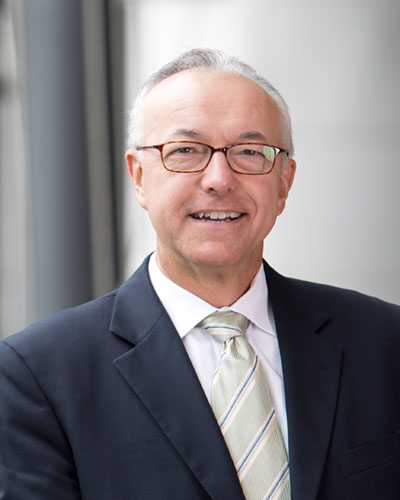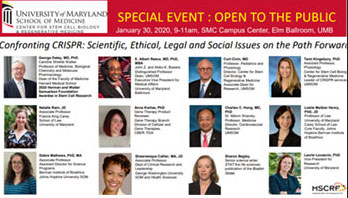January 28, 2020 | Deborah Kotz

Preeminent Legal Scholars, Physician-Scientists, and Medical School Leaders Convene Panel Discussion to Outline Their Vision for an Ethical Path Forward
University of Maryland School of Medicine (UMSOM) will be holding an expert panel on Thursday, January 30 with Harvard Medical School Dean George Daley, MD, PhD, and UMSOM Dean E. Albert Reece, MD, PhD, MBA, to confront the promise and peril of the gene editing technology CRISPR.
While the innovative technology holds enormous potential for treating and curing diseases caused by genetic mutations, it is also fraught with controversy as scientists and medical experts debate the full ethical implications of editing the genomes of human embryos to permanently alter the human species.
“We are bringing together government officials, medical ethicists, legal scholars, and researchers to outline the important issues and determine the best pathway to take as we anticipate this new technology being made available to a growing array of patients,” said Curt Civin, MD, Professor of Pediatrics and Physiology and Director of the Center for Stem Cell Biology & Regenerative Medicine at UMSOM who will serve as a moderator for the panel discussion.
Using CRISPR to alter an embryo would affect the genetic basis of future generations. That possibility, coupled with claims in 2018 by a Chinese scientist that he altered embryos to create the first genome-edited babies, have renewed already heated debates about embryonic research, the moral and legal status of the embryo, and the role of government regulations.
What ethical issues does CRISPR raise? Do existing policies and regulations adequately address those concerns? Are the scientific, medical, and research communities taking steps to ensure that people of different racial and ethnic identities are represented in CRISPR research and will have access to new treatments? How should medical students prepare for these new innovations?
These and other questions will be addressed by these presentations and panel discussions. In addition to the two medical school deans, other panelists include:
- Anna Kwilas, PhD, Gene Therapy Product Reviewer at the Food and Drug Administration’s Center for Biologics and Evaluation Research
- Leslie Meltzer Henry, PhD, JD, Professor, Francis King Carey School of Law, University of Maryland
- Debra Matthews, PhD, MPH, Associate Professor, Berman Institute of Bioethics, Johns Hopkins University School of Medicine
- Charles C. Hong, MD, PhD, Dr. Melvin Sharoky Professor, Division of Cardiovascular Medicine; Director of Cardiovascular Research, Dept of Medicine, University of Maryland School of Medicine
- Shawneequa Callier, MA, JD, Associate Professor, Department of Clinical Research and Leadership, George Washington University School of Medicine and Health Sciences
“Leaders in medicine -- especially those of us responsible for teaching the next generation of physicians and scientists -- need to continuously look ahead and anticipate which innovations will soon be heading into our clinical practice and what that means for patients,” said Dean Reece, who is also the John Z. and Akiko K. Bowers Distinguished Professor and Executive Vice President for Medical Affairs at University of Maryland Baltimore. “CRISPR is coming and with its arrival is the need to develop strong guidelines on its implementation, not only for the scientific community, but for the public as a whole.”
The Inaugural Herman and Walter Samuelson Foundation Award and Lecture in Stem Cell Research
As part of his visit to UMSOM, Dean Daley will accept the Inaugural Herman & Walter Samuelson Award for Stem Cell Research. He will deliver a lecture on his research at an event to be held on the medical school campus in Baltimore on Wednesday, January 29. To learn more, please visit:
Confronting CRISPR: Scientific, Ethical, Legal and Social Issues on the Path Forward
About the University of Maryland School of Medicine
Now in its third century, the University of Maryland School of Medicine was chartered in 1807 as the first public medical school in the United States. It continues today as one of the fastest growing, top-tier biomedical research enterprises in the world -- with 45 academic departments, centers, institutes, and programs; and a faculty of more than 3,000 physicians, scientists, and allied health professionals, including members of the National Academy of Medicine and the National Academy of Sciences, and a distinguished two-time winner of the Albert E. Lasker Award in Medical Research. With an operating budget of more than $1.2 billion, the School of Medicine works closely in partnership with the University of Maryland Medical Center and Medical System to provide research-intensive, academic and clinically based care for nearly 2 million patients each year. The School of Medicine has more than $540 million in extramural funding, with most of its academic departments highly ranked among all medical schools in the nation in research funding. As one of the seven professional schools that make up the University of Maryland, Baltimore campus, the School of Medicine has a total population of nearly 9,000 faculty and staff, including 2,500 student trainees, residents, and fellows. The combined School of Medicine and Medical System (“University of Maryland Medicine”) has an annual budget of nearly $6 billion and an economic impact more than $15 billion on the state and local community. The School of Medicine faculty, which ranks as the 8th highest among public medical schools in research productivity, is an innovator in translational medicine, with 600 active patents and 24 start-up companies. The School of Medicine works locally, nationally, and globally, with research and treatment facilities in 36 countries around the world. Visit medschool.umaryland.edu
Contact
Office of Public Affairs
655 West Baltimore Street
Bressler Research Building 14-002
Baltimore, Maryland 21201-1559
Contact Media Relations
(410) 706-5260
Deborah Kotz
Director of Media Relations
Office of Public Affairs & Communications
University of Maryland School of Medicine
o: 410-706-4255
c: 410-804-0054
t: @debkotz2

